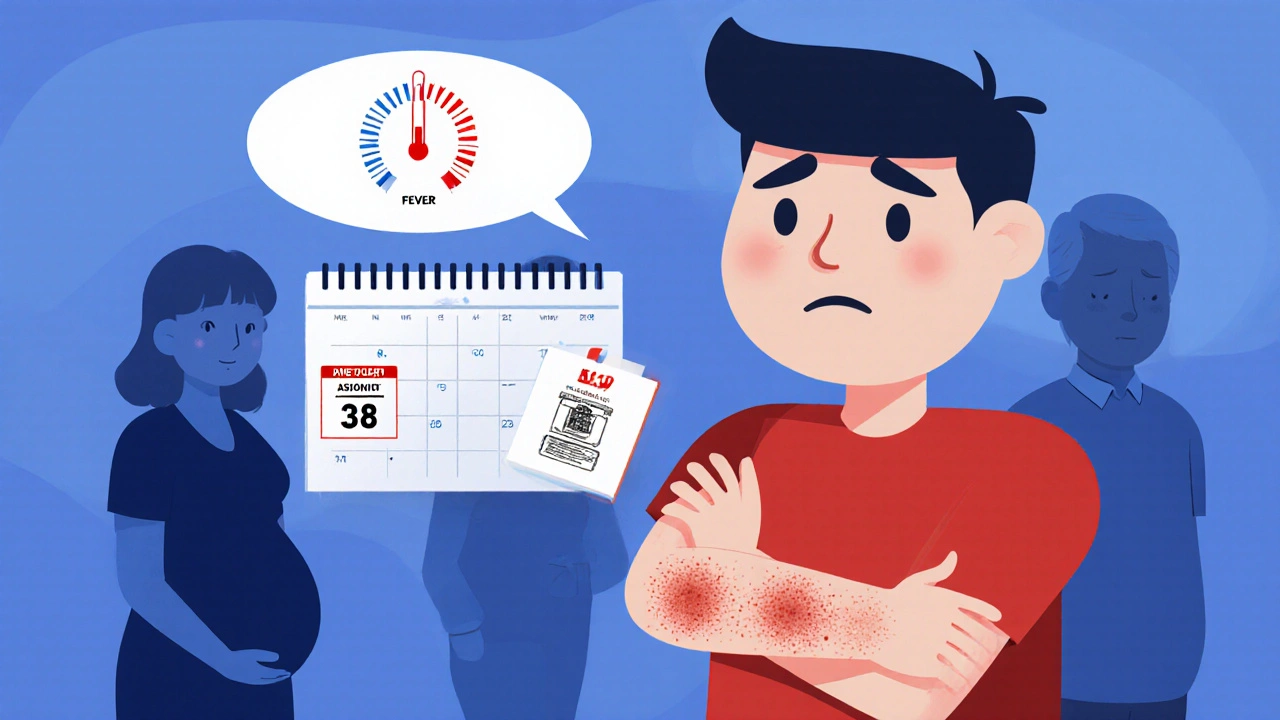Carbamazepine is a prescription medication classified as a sodium channel blocker. It is commonly used to control seizures in epilepsy, stabilize mood in bipolar disorder, and relieve pain from trigeminal neuralgia. Understanding the right way to take it can make a big difference in how well it works and how few side effects you experience.
What is Carbamazepine and How Does It Work?
Carbamazepine works by reducing the rapid firing of neurons that cause seizures or pain. It blocks voltage‑gated sodium channels, which slows down abnormal electrical activity in the brain. Because of this mechanism, doctors often start patients on a low dose and increase it gradually.
Why Timing and Dosage Matter
The drug’s effectiveness is closely tied to consistent timing. Taking it at the same times each day keeps blood levels stable, preventing breakthrough seizures or mood swings. Missed doses can cause a sudden drop in concentration, leading to “rebound” symptoms that feel worse than before.
Dos: Best Practices for Taking Carbamazepine
- Take the medication exactly as prescribed-usually twice daily with food to reduce stomach upset.
- Use a weekly pill organizer to avoid missing doses.
- Have your blood levels checked after the first 2-3 weeks, then every 3-6 months.
- Stay hydrated; adequate fluid intake helps the kidneys clear metabolites.
- Report any new rash, fever, or unexplained bruising to your doctor immediately.
Don’ts: Common Pitfalls to Avoid
- Don’t abruptly stop the medication without medical supervision; tapering is essential.
- Avoid crushing or chewing extended‑release tablets unless directed.
- Don’t mix carbamazepine with alcohol or strong sedatives; the combo can increase dizziness.
- Never double up on a missed dose-just take the next scheduled one.
- Skip over drug interaction checks; carbamazepine is a potent inducer of the enzyme CYP3A4, affecting many other meds.
Managing Side Effects
Typical side effects include drowsiness, nausea, and mild dizziness. Most improve after the first few weeks. If you notice persistent blurred vision, severe rash, or signs of low blood counts (e.g., unusual bruising), contact your health provider right away. These could signal rare but serious reactions like Stevens‑Johnson syndrome.
Drug Interactions to Watch
Carbamazepine speeds up the metabolism of several drugs because it activates CYP3A4. Common culprits include:
| Medication | Effect |
|---|---|
| Valproic acid | May increase carbamazepine levels, raising toxicity risk. |
| Oral contraceptives | Effectiveness can drop; consider backup contraception. |
| Anticoagulants (e.g., warfarin) | Reduced anticoagulant effect; monitor INR closely. |
| Macrolide antibiotics | Can cause elevated carbamazepine concentrations. |
Special Populations
Pregnancy: Carbamazepine crosses the placenta. While it remains a treatment option for women with uncontrolled epilepsy, doctors often weigh the risk of birth defects against seizure control. Folic acid supplementation is recommended before conception.
Elderly patients: Age‑related liver changes can slow drug clearance, so lower starting doses are typical. Watch for increased sedation, which raises fall risk.

When to Seek Medical Help
- Sudden appearance of a skin rash that spreads rapidly.
- Fever above 38°C accompanied by flu‑like symptoms.
- Unexplained bleeding or bruising.
- Intensifying mood swings or new depressive thoughts.
Prompt evaluation can prevent complications and allow dose adjustments.
Quick Checklist Before Your Next Dose
- Did I take the pill with food?
- Is my schedule consistent with the previous doses?
- Have I checked for new meds or supplements that might interact?
- Do I feel any new side effects that need reporting?
Frequently Asked Questions
Can I take carbamazepine on an empty stomach?
It’s best to take it with a meal or snack. Food helps reduce nausea and stabilizes absorption, making blood levels less variable.
How long does it take to feel the full benefit?
Most people notice seizure control or mood stabilization within 1-2 weeks, but the optimal dose may not be reached until 4-6 weeks.
Is it safe to drink alcohol while on carbamazepine?
Alcohol can magnify dizziness and drowsiness. Moderate consumption might be acceptable for some, but discuss your drinking habits with your prescriber.
What should I do if I miss a dose?
Take the missed dose as soon as you remember, unless it’s almost time for the next one. In that case, skip the missed dose and continue with your regular schedule.
Can carbamazepine affect birth control pills?
Yes. Carbamazepine can lower hormone levels, making oral contraceptives less effective. Use a backup method like condoms or consider a non‑hormonal option.





October 24, 2025 AT 12:11 PM
Looks like Big Pharma finally decided to hand us a "guide" so we don't overdose on their miracle pills 🙄. Of course they conveniently forget to mention the hidden agenda behind all those enzyme inducers. Stay woke, folks 😏.
October 26, 2025 AT 18:45 PM
omg this is sooo basic 🙄
October 29, 2025 AT 02:18 AM
Great rundown! I always keep a pill box and set alarms on my phone to stay on schedule, which cuts down on the missed‑dose headaches. Checking blood levels every few months has saved me from nasty side‑effects. Also, drinking plenty of water really helps the kidneys clear those metabolites faster. If anyone feels a rash, don’t wait-call your doc ASAP.
October 31, 2025 AT 09:51 AM
Totally agree, consistency is key. I set my meds with breakfast and dinner.
November 2, 2025 AT 17:25 PM
One thing to watch: carbamazepine can lower the efficacy of oral contraceptives by inducing CYP3A4, so using backup birth control is wise. It also speeds up the metabolism of warfarin, which may require more frequent INR checks. Antibiotics like erythromycin can push carbamazepine levels up, increasing toxicity risk. Always run a drug‑interaction check before adding a new prescription.
November 5, 2025 AT 00:58 AM
When we consider carbamazepine, we must look beyond the immediate seizure control and explore its broader impact on neurological harmony. The drug's modulation of sodium channels mirrors the delicate balance many cultures seek between order and chaos. While the pharmacology is sound, the patient's environment-diet, stress, and social support-plays an equally vital role in outcomes. Regular monitoring becomes a ritual of self‑awareness, a communal act of caring rather than a mere clinical checkbox. Moreover, the potential for severe skin reactions reminds us of the thin veil between therapeutic benefit and systemic vulnerability. Engaging with healthcare providers as partners, not subjects, empowers patients to navigate these complexities. In essence, medication adherence is a dance between chemistry and consciousness. Let us respect both the science and the lived experience.
November 7, 2025 AT 08:31 AM
Listen up! Missing a dose isn’t just a slip-it’s a betrayal to your own brain’s rhythm. The sudden drop can trigger rebound seizures that feel like a lightning storm in your skull. Hydration isn’t optional; it’s the lifeline that flushes toxic metabolites. Combine that with a steady meal schedule and you’ll keep those blood levels as flat as a calm sea. And never, ever double‑up-one more pill won’t make you stronger, it’ll just crank up the danger.
November 9, 2025 AT 16:05 PM
Wow, drama central over a pill schedule 🙄. Sure, stay hydrated, but let's not pretend this is the apocalypse every time you forget breakfast. Maybe just set a reminder and quit the theatrical monologue.
November 11, 2025 AT 23:38 PM
Ah, the grand tragedy of a missed dose-truly Shakespeare would weep! Yet here we are, reduced to emojis and sarcasm, while lives hang in the balance. Let us not diminish the gravity with snark, but rather uplift each other with earnest counsel.
November 14, 2025 AT 07:11 AM
I love how everyone is sharing practical tips. Using a weekly organizer really saved me from forgetting doses during busy weeks. Also, keeping a symptom diary helped my doctor fine‑tune the dose quickly. Thanks for the collective wisdom!
November 16, 2025 AT 14:45 PM
Totally same here thanks for sharing 😊
November 18, 2025 AT 22:18 PM
Carbamazepine can be a lifesaver, but its safe use hinges on a few cornerstone habits that everyone should adopt. First, establish a rigid dosing schedule-take the medication at the same times each day, ideally with food, to minimize gastrointestinal upset and ensure stable plasma concentrations. Second, maintain a dedicated medication organizer; a weekly pill box prevents accidental omissions and helps you visualize any missed doses immediately. Third, regular blood work is indispensable: obtain a baseline level after 2–3 weeks of therapy and continue monitoring every three to six months, or sooner if you notice new symptoms. Fourth, stay vigilant for dermatologic signs such as a spreading rash or fever, which may herald Stevens‑Johnson syndrome-a medical emergency that demands prompt discontinuation and specialist care. Fifth, be proactive about drug interactions; carbamazepine induces CYP3A4, reducing the efficacy of oral contraceptives, warfarin, and several antibiotics, so always inform your prescriber of any new medications, over‑the‑counter products, or supplements. Sixth, limit alcohol consumption because the combination can exacerbate dizziness and sedation, compromising safety, especially when driving or operating machinery. Seventh, keep your hydration levels adequate-drinking plenty of water assists renal clearance of metabolites and can mitigate some side‑effects. Eighth, educate your close contacts about the importance of not doubling doses if a dose is missed; the safest route is to skip the forgotten dose and continue with the next scheduled one. Ninth, in special populations such as the elderly, start at a lower dose and titrate slowly, monitoring for increased sedation and fall risk. Tenth, for women of childbearing age, supplement with folic acid before conception and discuss the risk‑benefit ratio with your neurologist, as carbamazepine crosses the placenta and may be linked to neural tube defects. Eleventh, always have an emergency plan: keep a written list of your medications, dosages, and allergies accessible, and ensure your emergency contacts are aware of your condition. Twelfth, engage in regular follow‑up appointments to discuss mood changes, as carbamazepine can affect emotional stability in bipolar disorder. Thirteenth, consider complementary lifestyle measures-adequate sleep, stress reduction techniques, and a balanced diet-to bolster overall neurological health. Fourteenth, never stop the drug abruptly; a physician‑guided taper prevents withdrawal seizures and rebound phenomena. Finally, remember that while guidelines provide a framework, individualized care is paramount; collaborate closely with your healthcare team to tailor the regimen to your unique needs and circumstances.
November 21, 2025 AT 05:51 AM
Well said-consistent monitoring truly makes a difference.
November 23, 2025 AT 13:25 PM
All that advice sounds nice, but most patients can’t afford monthly blood tests. The system needs cheaper alternatives.